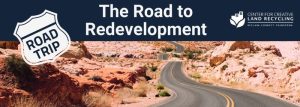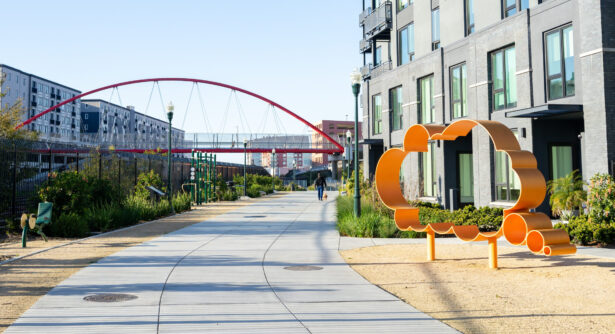
The Road to Redevelopment: Promoting Coalitions in Arizona and Nevada

CCLR’s on-the-ground efforts are an important way that our organization assists in land recycling. However, in the past couple years CCLR’s in-person events, site visits, meetings and presentations were sidelined due to the COVID pandemic. In 2022 we were able to return full force, hosting both the East Bay Environmental Forum and the California Land Recycling Conference in-person.
Importantly, we were also able to get back into the field, meeting communities where they are in their redevelopment process. This fall, Ignacio Dayrit and Sheryl Gonzales traveled to Southeastern Arizona and Northern Nevada. They toured sites, met partners & potential grant applicants, gave presentations, and learned first hand about the unique challenges faced by those working to revitalize, rebuild, and restore western towns and cities.

Ignacio and Sheryl in Virginia City, Nevada
The road to redevelopment can be a long, lonely journey for smaller, rural, and under resourced communities. A common challenge we have heard a lot in the last few years is a lack of capacity to apply for and manage grants. See if this sounds familiar: layoffs, cut backs, early retirement, and increased community needs due to the pandemic have left many in redevelopment and economic fields with too much to do, and not enough time or resources to take on new projects. With historic levels of funding available from the EPA and other agencies, communities will need to find creative ways to tap into this much-needed funding without overburdening themselves.
 |  |
A shuttered building in Nogalas that could benefit from brownfields grant funding
Thankfully, there are solutions to help with capacity issues, namely partnerships and coalitions. By joining with like-minded local organizations, such as nonprofits, as well as larger government bodies such as Council of Governments, Economic Development Agencies, or Counties, communities with fewer resources can share the responsibilities with better resourced groups.
Partnerships
Partnerships are essential for brownfield reuse projects. To truly benefit the community, it must involve the community, which means getting out there and meeting and engaging with local stakeholders. Here are some of the partners you may engage with:
Partners in Brownfields Reuse:
- Governmental agencies: federal, state, regional, county, local and districts
- Community-based/grassroots/faith-based organizations, neighborhood organizations
- Local business and property owners, and Chamber of Commerce
- Colleges and universities
- Parks, open space and trails, bike and pedestrian groups
- Arts and culture community
- Consultants: planning, sustainability and environmental
- CDFI and Lenders
- Real estate development professionals
Identifying Partners
Some partners are essential. All brownfields redevelopment projects will need input from governmental agencies for permits, approvals, certifications, and infrastructure. All brownfields redevelopment projects will also need to engage with the local community through community outreach. Many potential partners may simply be companies, organizations and institutions near your site. Buy in from local businesses, the arts and culture community, schools, and other important stakeholders can also improve the chances of your project’s success.
Some partners can help with capacity: EPA MARC grants can provide funding for certain consultants, nonprofits and community groups that may help with outreach, and lenders and development professionals can assure the final project pencils out. Government agencies, nonprofits, park districts, and universities are also eligible for redevelopment grants. Don’t be afraid to approach an eligible entity with a potential brownfields project pitch and ask that they take the lead on the project with your support.
Successful Partnership: A Church Drives Community Reinvestment

Saint Rest Baptist Church in West Fresno formed a Community Economic Development Coalition and partnered with regional non profits, such as the Central Valley Community Foundation, as well as the City of Fresno to purchase and redevelop an abandoned gas station into a thriving community asset. The remediation process is ongoing, however Saint Rest Baptist Church and its partners are already providing healthy food and safe recreation space for the neighborhood. For more information on this partnership and its results, view the slidedeck from the “Interem to Reuse: Creative Placemaking in Brownfields” from the 2022 California Land Recycling Conference.
Coalition Grants
Coalitions are the ideal way to increase your capacity by joining others in the grant application. Assessment Coalition Grants are designed for one lead eligible entity to partner with two-to-four eligible entities that have limited capacity to manage their own cooperative agreements. The lead coalition member is typically a regional organization, such as an Economic District, County, or Regional Government Organization while partners can be smaller municipalities, nonprofits, and other organizations eligible for brownfields grants that are within the lead coalition member’s jurisdiction.

Examining coalition opportunities in Northern Nevada
CCLR’s Sheryl Gonzales has successfully managed coalition grants in Nevada. She says, “The main benefit of coalition grants is that it reduces the burden on communities.” Coalitions meet monthly with the EPA which provides guidance, identifies opportunities, and helps coalitions work through challenges. “Each coalition member has the opportunity to address its individual needs while also approaching redevelopment holistically. Coalitions help find solutions that have benefits that work in tandem or help solve regional problems.”
Example of a successful coalition:
Northern Nevada Development Authority (NNDA), Churchill, Douglas and Lyons County, and Carson City.
The NNDA has been awarded three, three-year coalition grants with counties it supports in the Sierra Nevada region of north western Nevada. With each of these grants, the NNDA supported two of the other government entities in their brownfields projects. A total of $1.8 million has been directly invested into the region between 2014-2021 through these coalition grants.
Results:
- William N. Pennington Life Center in Fallon: a 16,000 sqft senior center with recreation, art, salon and medical services
- Polaris Industries Distribution Center, Fernley: 100 full time jobs
- Gardenville Station, Gardenville: Repurposed closed gas station into a welcome center and community meeting place.
- William N. Pennington Life Center, Fallon
- Polaris Distribution Center, Fernley
- Gardenville Station, Gardenville
The road to revitalization doesn’t have to be a lonely process. Make redevelopment a collaborative effort by including neighboring communities, larger entities, those in your community, and CCLR. Leverage the strengths, knowledge and resources of others and watch as your plans become better without increasing your already full workload.
How CCLR Can Help you Build a Partnership or Coalition:
CCLR’s staff has decades of direct experience applying for and administering brownfields grants, and helping communities like yours with your brownfield needs. Send us an email at [email protected] if you would like more information about forming a coalition or how to find potential partners.







